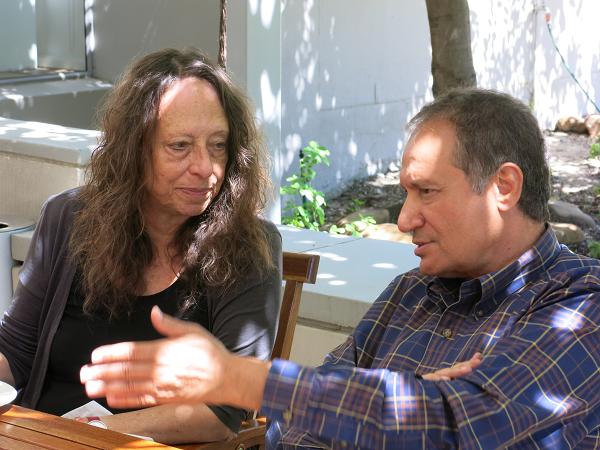
Carol Gilligan and Abdallah Daar in conversation at STIAS
Carol Gilligan recently spent a month at STIAS working on her project Listening. On 10 March 2014 she gave a public STIAS lecture entitled Moral Injury and the Ethic of Care: Reframing the Conversation about Differences.
Louise du Toit from the Department of Philosophy at Stellenbosch University introduced her and below reflects on the occasion:
Carol Gilligan first became known with the publication of her best-seller at Harvard University Press, In a Different Voice (1982), in which she famously recasts moral thinking in terms of voice, responsibility and relationships. Her book became a beacon in the Anglo-American version of ‘difference feminism’ since it seemed that she had unearthed the long repressed and inaudible ‘different moral voice’ of women, or at least a feminine value set or range of responses to moral questions that had long been undervalued and cast as moral immaturity in mainstream moral theorising. Her call was for a new appreciation of this moral approach, soon termed a feminine ‘ethics of care’, and theorised as distinguishable from the more traditional, masculine, ‘ethics of justice’, focused on moral autonomy, individual rights and fairness.
More than thirty years later, Gilligan is explicitly critical of any sharp distinctions between the feminine and masculine, and especially so when gender is constructed as a (naturalised) binary or opposition and a hierarchy. She now frames gender identities in terms of stunted humanity, of an injurious and traumatic interruption of the human condition itself. Consequently she now claims that the ‘different voice’ she discerned earlier on ‘is, simply, a human voice’ (2014: 90). On 10 March 2014, she gave a public STIAS lecture on campus, based on the article, ‘Moral Injury and the Ethic of Care: Reframing the Conversation about Differences’ (Journal of Social Philosophy, Vol. 45 No. 1, Spring 2014, pp.89-106). There, she links the idea of moral injury, i.e. to be psychically damaged through a culturally sanctioned betrayal of what is right, to children’s initiation into gendered identities. Their initiation around adolescence into femininity entails that girls lose through internalised repression their strong and knowing voice, and their initiation around the age of five into masculinity, causes boys to lose through internalised repression their caring and connecting voice. Drawing on the growing body of work which describes human infants as thoroughly ‘interpersonal’ beings (e.g. De Waal, Hrdy, Damasio), Gilligan dramatically inverts the question moral philosophers have been posing for centuries. Instead of asking how fundamentally egotistic and selfish beings can ‘develop’ into moral beings that take others into consideration, she asks instead: ‘how do we lose the capacity to care … to empathize with others and … the capacity to love?’. Initiation into patriarchal gender scripts entails for her a ‘shattering of trust’ (a betrayal) that ‘compromises our ability to love’ (p. 90), leading to the trauma responses of ‘the separation of the self from relationships and the splitting of thought from emotion’ (p. 89).
The theoretical innovations proposed by Gilligan spring from the rich yields of her own empirical research which moved over the years from listening to pregnant women deliberating on whether or not to have an abortion, to adolescent girls resisting their initiation into patriarchal femininity (cf. Making Connections, 1990; Meeting at the Crossroads, 1992) to school-entering boys who learn to painfully adapt to the codes of patriarchal masculinity (Joining the Resistance, 2011). Over years of fine-tuning her listening practices, she had developed a deep practical as well as theoretical understanding of the importance of good listening, leading eventually to the creation of a Listening Guide which systematises her approach. Listening for conflicting, competing voices in her research subjects, she came to understand the central importance of proper, attentive listening for the creation of trust, i.e. for breaching the initial betrayal in order to retrieve the repressed voice of care, of understanding and of connection, the discredited ‘take’ on the world.
This is then precisely the point where Gilligan’s detailed focus on individual lives turns into a critical psychology and a politics of resistance, because patriarchy is so clearly at odds with, and fundamentally threatening to, democracy, ‘which rests on a presumption of equal voice or equality’ (p. 95). Her political resistance to patriarchy however is not only grounded in the rational judgment that it is unjust, unequal and exclusionary, but also in an understanding of the affective, emotional and psychological costs all of humanity pays for its upkeep: ‘By splitting human qualities into “masculine” or “feminine”, the gender binary forces dissociation, and the hierarchy undermines trust’ (p. 95). In both boys and girls, patriarchy’s initiation ‘shatter[s] the ability to live with integrity [the particular loss of girls] in connection with others [the particular loss of boys]’ (p. 95). This is why there is finally nothing Romantic or naïve about her claim that ‘[l]ove is the force that has the power to upset a patriarchal order’ (p. 100) and in her 2002 book, The Birth of Pleasure: A New Map of Love, she critically looks at how love in Western culture has consistently been associated with loss and tragedy – almost inevitably doomed by patriarchy’s betrayal of trust. She believes that we can and must change these patterns, and suggests way of doing so. It would be a grave mistake for anyone who knows of Gilligan mainly or only because of her early work in In a Different Voice to fail to engage with her later work which so clearly shows why feminist concerns are human concerns.
